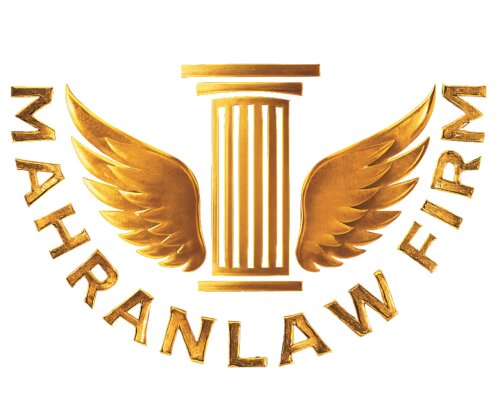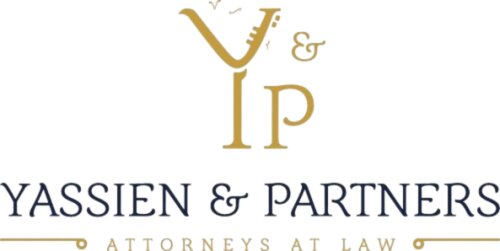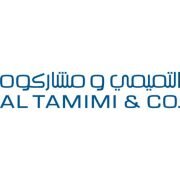Best International Trade Law Lawyers in Agouza
Share your needs with us, get contacted by law firms.
Free. Takes 2 min.
List of the best lawyers in Agouza, Egypt
About International Trade Law Law in Agouza, Egypt
International trade law in Agouza, Egypt covers the rules and processes that govern cross-border commerce for businesses and individuals located in or doing business through Agouza. Although Agouza is a district of Giza within the greater Cairo metropolitan area, trade matters arising there are governed by national Egyptian law, international agreements to which Egypt is a party, and administrative rules enforced by national agencies. Common topics include import and export controls, customs procedures, trade contracts, international sale of goods, transport and shipping claims, trade remedies, foreign investment rules, currency controls, and dispute resolution options such as litigation and arbitration. Local lawyers in Agouza work with national authorities, customs brokers, banks, and international partners to help clients comply with applicable rules and to resolve commercial disputes.
Why You May Need a Lawyer
International trade involves many technical legal and administrative requirements. You may need a lawyer if you face any of the following situations:
- Complex contract negotiations with foreign suppliers or buyers, including drafting and reviewing terms for delivery, payment, risk allocation, and choice of law.
- Problems with letters of credit or other trade finance instruments handled by banks.
- Customs disputes such as incorrect classification, valuation disagreements, seizure of goods, or penalties for non-compliance.
- Regulatory compliance issues including import bans, licensing requirements, sanitary and phytosanitary rules, product standards, and labelling obligations.
- Disputes over non-performance, defective goods, delay in shipment, or damage during transit that may require litigation or arbitration.
- Anti-dumping, countervailing duty or safeguard investigations initiated by Egyptian authorities or by foreign jurisdictions.
- Foreign investment and joint venture structuring, including negotiating shareholder agreements and protecting intellectual property in cross-border transactions.
- Enforcement and recognition of foreign judgments or arbitral awards in Egypt, including collection against assets located in Agouza or elsewhere in Egypt.
- Advice on sanctions, export controls, or foreign currency and repatriation rules that affect payments and profit transfers.
Local Laws Overview
While many rules affecting international trade are national in scope, the following legal and administrative frameworks are especially relevant for someone in Agouza:
- Customs and Import Regime - Egyptian customs law sets tariff classifications, duties, valuation methods, and procedural requirements for imports and exports. Customs audits and assessments can lead to penalties and detention of goods if documentation or declarations are deficient.
- Trade and Industry Regulations - The Ministry of Trade and Industry oversees trade policy, licensing for certain commodities, and compliance with national technical standards. Product safety, labelling, and conformity assessment requirements may apply to food, chemicals, electronics and other regulated goods.
- Export and Import Control Bodies - Agencies such as the authority responsible for export-import control and any inspection bodies carry out pre-shipment inspections, issue certificates of origin, and enforce commodity-specific restrictions.
- Currency and Banking Rules - The Central Bank of Egypt issues rules on foreign currency transactions, repatriation of profits, and documentary credits. Banks in Agouza follow international banking rules such as the UCP for letters of credit while complying with local controls.
- Contract and Commercial Law - Egypt uses civil and commercial codes to govern contracts, sales, and commercial obligations. Choice of law and jurisdiction clauses are important, but may be subject to mandatory Egyptian public policy or procedural rules when enforcement is sought locally.
- Dispute Resolution - Commercial disputes can be brought before civil and commercial courts in Giza or Cairo. Egypt also provides arbitration as a common alternative, with prominent centers operating in Cairo. Egyptian law recognises arbitration agreements and provides for enforcement of arbitral awards, subject to local legal requirements.
- Tax and Customs Duties - Import duties, value-added tax and other indirect taxes apply to cross-border transactions and may affect pricing and cash flow. Proper classification and valuation are central to correct duty assessment.
Frequently Asked Questions
What documents do I need to import goods into Egypt from abroad?
Typical documents include a commercial invoice, packing list, bill of lading or air waybill, certificate of origin, any required licenses or permits, inspection certificates if applicable, and insurance documents. Banks and customs may require additional forms for duty assessment and release. A specialized trade lawyer or customs broker can check the documents required for your specific goods.
Can a foreign company sue or be sued in Egypt for a trade dispute?
Yes. Foreign companies can be party to litigation and arbitration in Egypt. Commercial disputes may be heard by Egyptian courts or by arbitration tribunals if there is a valid arbitration agreement. Enforcing foreign judgments in Egypt can be complex and often requires local legal advice to determine whether enforcement is possible under Egyptian rules.
What are the common customs problems and how can a lawyer help?
Common customs problems include incorrect tariff classification, undervaluation claims, missing permits, seizure of goods, and fines for non-compliance. A lawyer can assist by preparing correct declarations, representing you in administrative appeals, negotiating with customs authorities, and handling litigation if needed.
How are disputes commonly resolved - court or arbitration?
Both options are used. Arbitration is popular for international commercial contracts because of confidentiality, speed and enforceability of awards under international conventions. Local courts handle many enforcement and procedural matters, and some disputes may require court-based steps even when arbitration is chosen. A lawyer can advise which forum suits your case best.
Do I need to translate commercial documents into Arabic?
In many legal and administrative proceedings in Egypt, Arabic is the official language. Official submissions, contracts and court filings often need Arabic translations and notarization. A lawyer will advise which documents require certified translation and can coordinate that service.
What should I include in a sales contract to protect my interests?
Key clauses include clear descriptions of goods, price and payment terms, delivery terms and INCOTERMS, risk transfer, warranties and inspection procedures, claims and limitation of liability, force majeure, governing law and dispute resolution, and termination rights. Local legal review ensures clauses are enforceable and consistent with Egyptian mandatory rules.
How long does a trade dispute take to resolve in Egypt?
Timeframes vary widely. Administrative customs appeals may take a few months to more than a year. Court litigation can take one year or several years depending on complexity and appeals. Arbitration may be faster, but still depends on the case and procedural steps. Your lawyer should provide an estimated timeline based on the facts.
What are the risks of ignoring customs or import regulation breaches?
Risks include seizure or destruction of goods, significant fines, criminal prosecution in serious cases, reputational damage, and costly delays. Non-compliance can also affect future clearance and increase scrutiny from authorities. Early legal advice helps avoid or mitigate these risks.
How do sanctions and export controls affect trade with Egypt?
Export controls and any applicable sanctions can restrict the sale or transfer of certain goods, technologies or services, and may affect payment channels. Egyptian importers and exporters must also be mindful of international sanctions regimes that apply to their trading partners. A lawyer can advise on compliance and risk mitigation measures.
How much will hiring a trade lawyer in Agouza cost?
Costs depend on the nature of the work - transactional advice, routine customs matters, or litigation and arbitration have different fee structures. Lawyers may charge hourly rates, flat fees for certain services, or contingency arrangements in limited cases. Ask for an engagement letter that sets out fees, billing practices and estimated costs before starting work.
Additional Resources
Helpful public and private bodies to consult include the Ministry of Trade and Industry for policy and licensing guidance - the Egyptian Customs Authority for customs procedures and tariff information - the Central Bank for foreign exchange and banking rules - the agency responsible for export and import control and product inspections for certificates and compliance - the Federation of Egyptian Chambers of Commerce for trade facilitation and local business contacts - the Cairo Regional Centre for International Commercial Arbitration for arbitration services and rules - the General Authority for Investment and Free Zones for investment procedures. Local professional contacts such as customs brokers, freight forwarders, certified translators, and experienced trade lawyers in Agouza or nearby Cairo/Giza are also practical resources.
Next Steps
If you need legal assistance with an international trade matter in Agouza, follow these steps:
- Gather documents - collect contracts, invoices, transport documents, customs declarations, permits and correspondence related to the issue.
- Define the problem clearly - prepare a short factual summary outlining what happened, the commercial impact, and the outcome you want.
- Seek an initial consultation - contact a lawyer experienced in international trade and customs law. Ask about their relevant experience, typical outcomes and fee structure.
- Confirm scope and engagement - have the lawyer prepare an engagement letter or retainer agreement that explains services, timelines and fees.
- Consider alternatives - discuss negotiation, mediation or arbitration as alternatives to litigation if appropriate.
- Keep records and stay involved - provide requested documents promptly, communicate decisions, and follow your lawyer's compliance and risk management recommendations.
Taking timely legal advice helps protect your business, reduce losses, and resolve disputes more effectively. Local trade lawyers in Agouza can combine knowledge of Egyptian law and practical experience with customs and commercial practice to guide you through the process.
Lawzana helps you find the best lawyers and law firms in Agouza through a curated and pre-screened list of qualified legal professionals. Our platform offers rankings and detailed profiles of attorneys and law firms, allowing you to compare based on practice areas, including International Trade Law, experience, and client feedback.
Each profile includes a description of the firm's areas of practice, client reviews, team members and partners, year of establishment, spoken languages, office locations, contact information, social media presence, and any published articles or resources. Most firms on our platform speak English and are experienced in both local and international legal matters.
Get a quote from top-rated law firms in Agouza, Egypt — quickly, securely, and without unnecessary hassle.
Disclaimer:
The information provided on this page is for general informational purposes only and does not constitute legal advice. While we strive to ensure the accuracy and relevance of the content, legal information may change over time, and interpretations of the law can vary. You should always consult with a qualified legal professional for advice specific to your situation.
We disclaim all liability for actions taken or not taken based on the content of this page. If you believe any information is incorrect or outdated, please contact us, and we will review and update it where appropriate.













